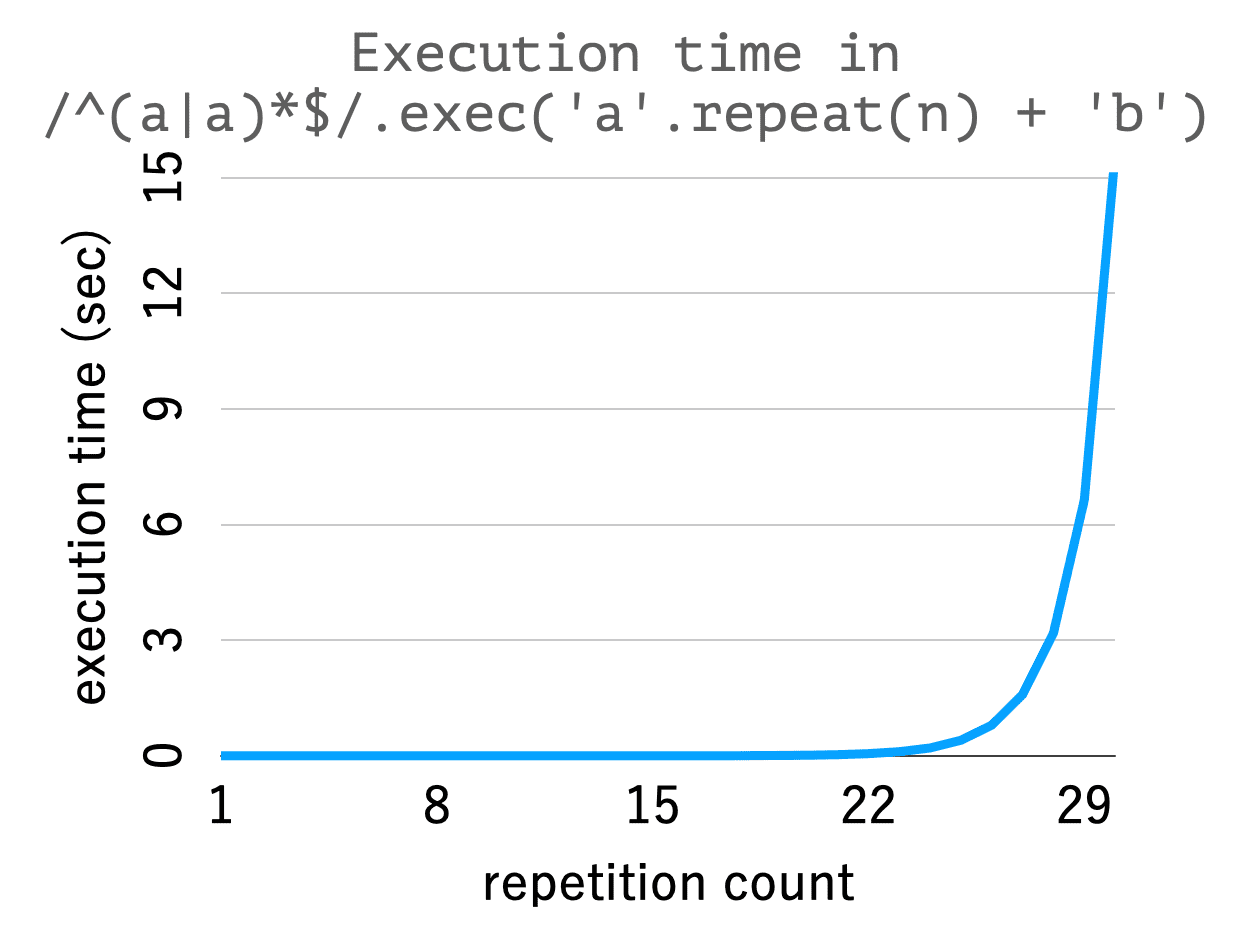
What is ReDoS vulnerability?
A regular expression is the most known text processing utility for programmers. There are many tools to use regular expression: grep, awk, and perl for example. Besides, a regular expression is used for other fields than text processing: bioinformatics and security for example. There are two known ways to implement regular expression matching. One uses deterministic finite automaton (DFA), and another uses backtracking. Recent implementations like Go’s regexp or Rust’s regex use a DFA-like approach. However, implementations on many programming languages use the backtracking approach.
When the regular expression matching is implemented based on the backtracking, it may take exponential or superlinear time complexity against an input string length. In other words, a short string may invoke a long matching time to a regular expression. See the following figure. It is a chart about the relation between matching times against /^(a|a)*$/ and input string lengths. It shows extremely increasing matching time against input string length.

ReDoS (Regular expression Denials of Services) is a computation complexity attack using this fact. In 2016, StackOverflow downs due to ReDoS for one example. It is caused by the regular expression to truncate whitespace in the front and the back of a string. In 2019, Cloudflare downs due to ReDoS for another example. This reason is the regular expression in WAF configuration. According to recent research [1], 10% of regular expressions of real uses have ReDoS vulnerability potentially.
As seen above, ReDoS is one of the most important security concerns recently. And, the importance of checking ReDoS vulnerability statically is increasing.
What is recheck?
recheck is a library to check ReDoS vulnerability in the given regular expression. Using recheck, you can find vulnerabilities in the given regular expression and can obtain an attack string to the vulnerability.
The following is an incomplete list of recheck features.
- Implements the state-of-the-art algorithm to detect ReDoS vulnerability. The implementation contains fuzzing with static analysis, and criteria to decide which algorithm is better to use against a regular expression, the algorithm based on automata theory or the fuzzing algorithm.
- Supports practical regular expression including backreferences and look-around operations. Especially, it follows ECMA-262 (as known as JavaScript) specification.
- Integrated recall validation. It can validate ReDoS vulnerability using the real interpreter when the candidate of the vulnerability is found.
- Published as a library in JavaScript and Scala. You can embed recheck into your application easily.
- Provides ESLint plugin. You can start to check the ReDoS vulnerability for your application code in a minute.
Changelog v4.5
New Features:
- #775 Add
cacheoption toeslint-plugin-redos(@makenowjust) - #799 Introduce
synckitfor speed-upcheckSync(@makenowjust)
Fixes:
- #777 Fix up cache implementation (@makenowjust)
- #800 Set
'conservative'as defaultcache.strategy(@makenowjust) - #805 Fix to decode
DurationforString(@makenowjust) - #872 Fix to work
RECHECK_SYNC_BACKENDcorrectly (@makenowjust)
Misc:
- #776 Fix heading in blog articles (@makenowjust)
- #781 Fix OS version of scala-steward CI for
GLIBCversion problem (@makenowjust) - #780 Update dependency org.scalameta:scalafmt-core_2.13 to v3.7.2 (@renovate[bot])
- #873 Fix React version to v17 (@makenowjust)
- #874 Drop Node
v14support, and add Nodev20support (@makenowjust)
Install & Use
Copyright (c) 2020-2022 TSUYUSATO “MakeNowJust” Kitsune